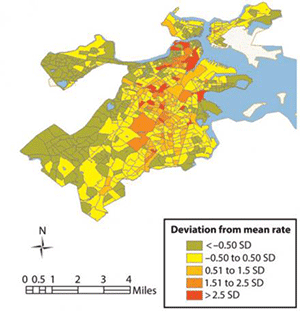COMPUTING RESEARCH HIGHLIGHT OF THE WEEK [February 21- February 28]
Could a computer on the police beat prevent violence?
 Detailed analysis of drugs, alcohol & crimes across a city could help target prevention, U-M study finds.
Detailed analysis of drugs, alcohol & crimes across a city could help target prevention, U-M study finds.
ANN ARBOR, Mich. — As cities across America work to reduce violence in tight budget times, new research shows how they might be able to target their efforts and police attention – with the help of high-powered computers and loads of data.
In a newly published paper, University of Michigan Medical School researchers and their colleagues have used real police data from Boston to demonstrate the promise of computer models in zeroing in on violent areas.
They combined and analyzed information in small geographic units, on police reports, drug offenses, and alcohol availability at stores, bars and restaurants, as well as the education levels, employment and other attributes of the people who live there.
The result: a detailed map of violent crime “hot spots”, and a better understanding of factors that create the right climate for violence. Both could help a city’s leaders and police focus resources on the areas where they can do the most good.
Source: University of Michigan Health System
Researchers:
Robert Lipton, U-M Medical School
Anthony Braga, Harvard University
Xiaowen Yang, MIT
Jason Goldstick, U-M statistician
Manya Newton, M.D., U-M emergency medicine doctor
Melissa Rura, Ph.D., Injury Center research analyst
‹ Current Highlight | Past Highlights ›
Computing Research Highlight of the Week is a service of the Computing Community Consortium and the Computing Research Association designed to highlight some of the exciting and important recent research results in the computing fields. Each week a new highlight is chosen by CRA and CCC staff and volunteers from submissions from the computing community. Want your research featured? Submit it!.




